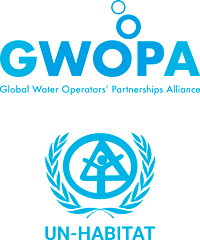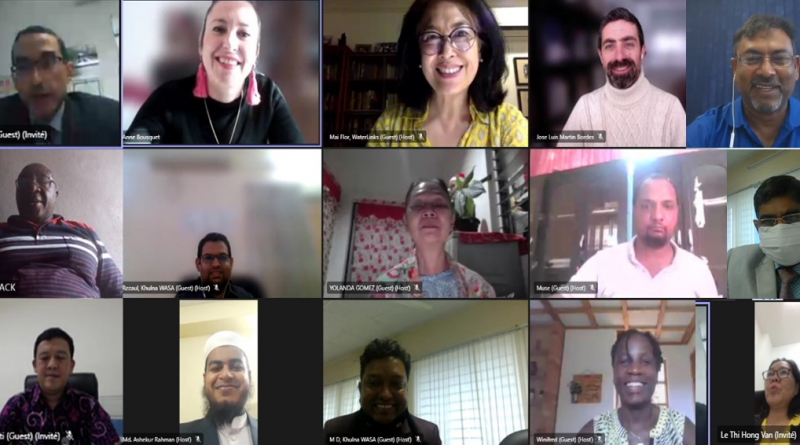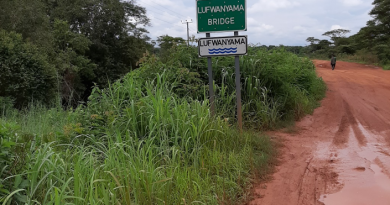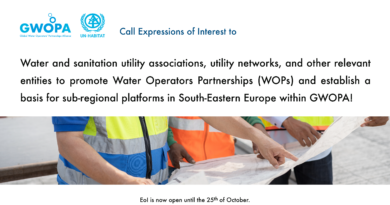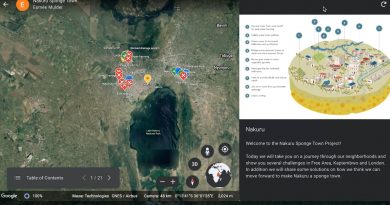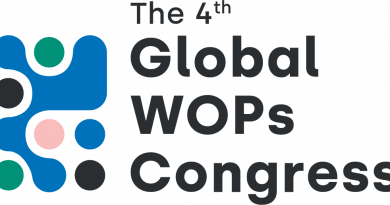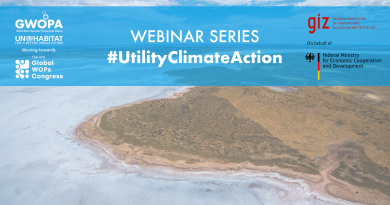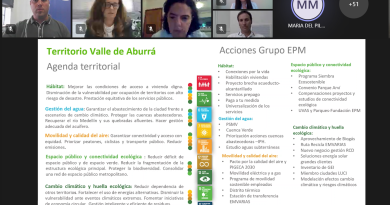Interregional workshop between OFID-funded projects proves the resilient and innovative nature of WOPs
The Sustainability Improvement Plan (SIP) WOP programme, funded by OPEC Fund for International Development (OFID), kicked off in September 2019 with the launch of five Water Operators’ Partnerships (WOPs) in Africa and Asia. Now, in early 2022, the implementation of the projects is coming close to an end.
GWOPA convened on the 13th of January an online closing workshop where representatives from the SIP WOPs (mentors and mentees), the regional coordinators WaterLinks and AfWA, and the donor, OFID, gathered to assess the work done on the ground by the teams, the main results, to reflect on the challenges and success factors, and discuss recommendations for the way forward.
Mr. Walid Mehalaine, OFID, offered on behalf of the donor organization the welcome remarks. Mr. Mehalaine reflected on the challenging times of the past two years, which have had a strong impact in the implementation of the projects. Mr. Mehalaine applauded the efforts made by all the individuals and organizations involved in the SIP WOP programme, which were key to keep up the momentum and advance in the work towards the Sustainable Development Goals and the performance improvement of the utilities and their capacity building.
The WOP facilitators for the programme, the African Water Association and WaterLinks, also welcomed the opportunity to learn from the experiences in other continents to help advance the WOPs.
Do WOPs work?
During the session, one live poll prepared by the GWOPA Secretariat was launched with the aim to understand whether the WOPs approach is having a positive impact despite the challenging times. This is what the participants responded:
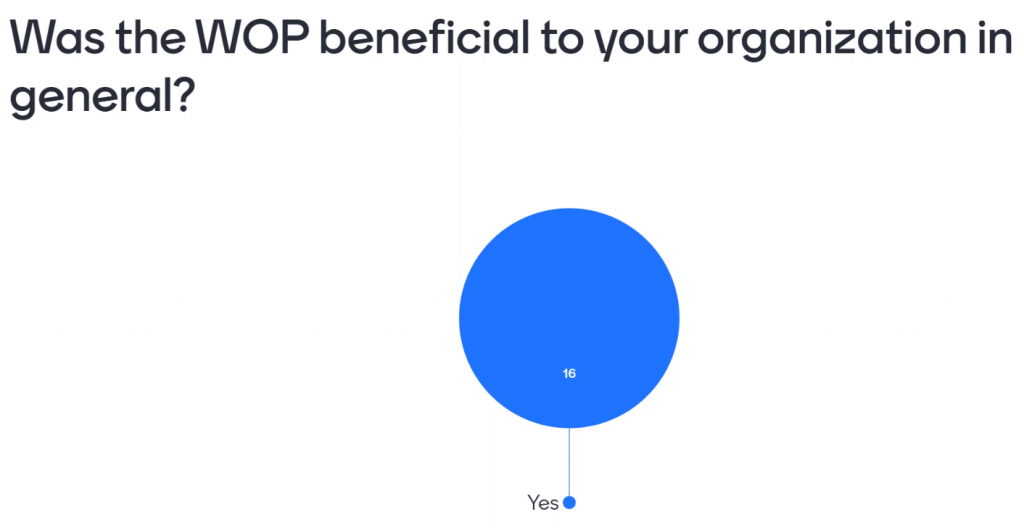
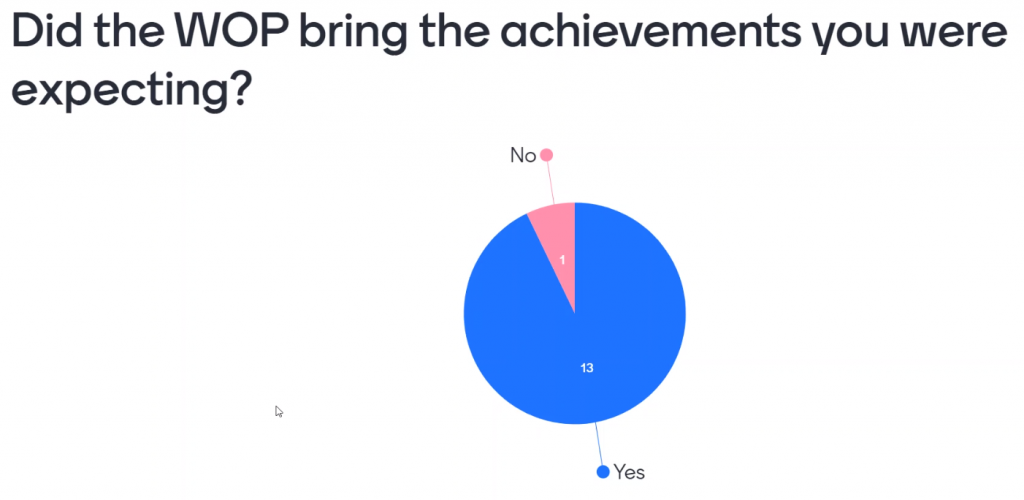
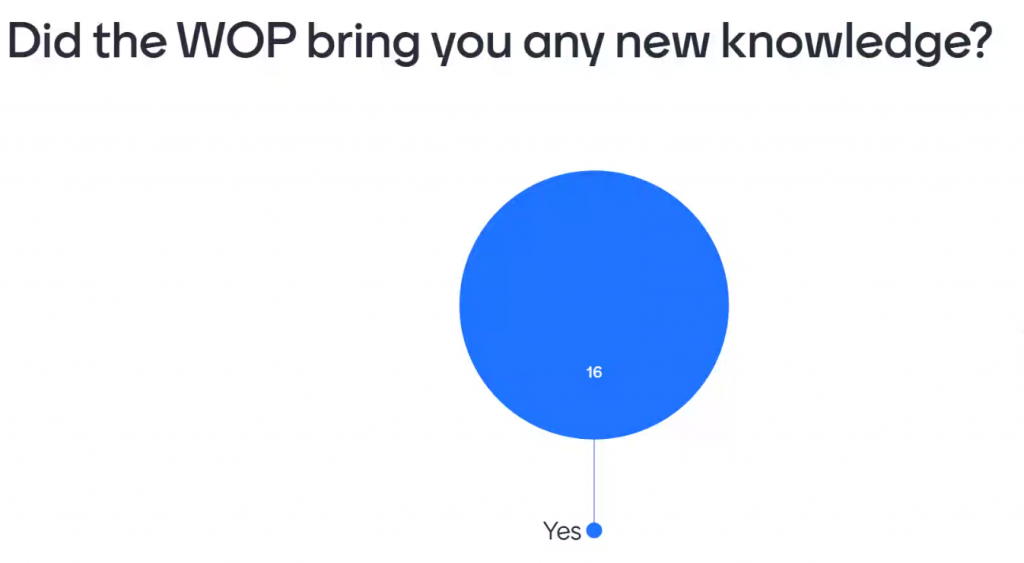
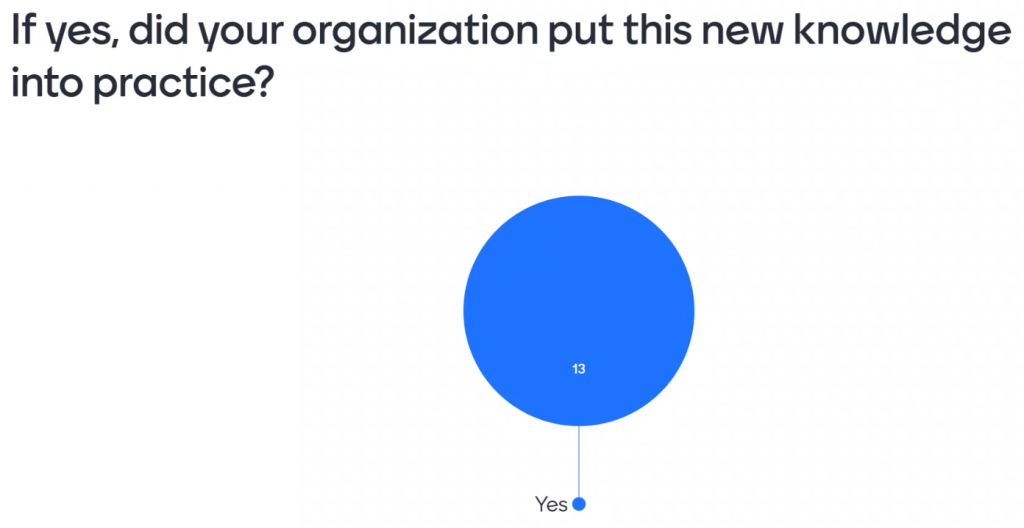
Progress overview by the facilitators
Like almost all WOP initiatives, this programme has been affected by the COVID pandemic-travel restrictions and increased safety measures. All five WOPs were able to go ahead with the exchange visits, which took place in 2019 and early 2020, before the introduction of travel bans or restrictions. These visits allowed staff to establish strong relationships and identify priorities and working areas for the projects before they adapted to the current context and switched to online exchange and implementation. Depending on the local context and capacities, the teams have been unequally successful in implementing their short term action plans through distance support from the mentors. Nevertheless, the programme yielded impressive results despite the circumstances.
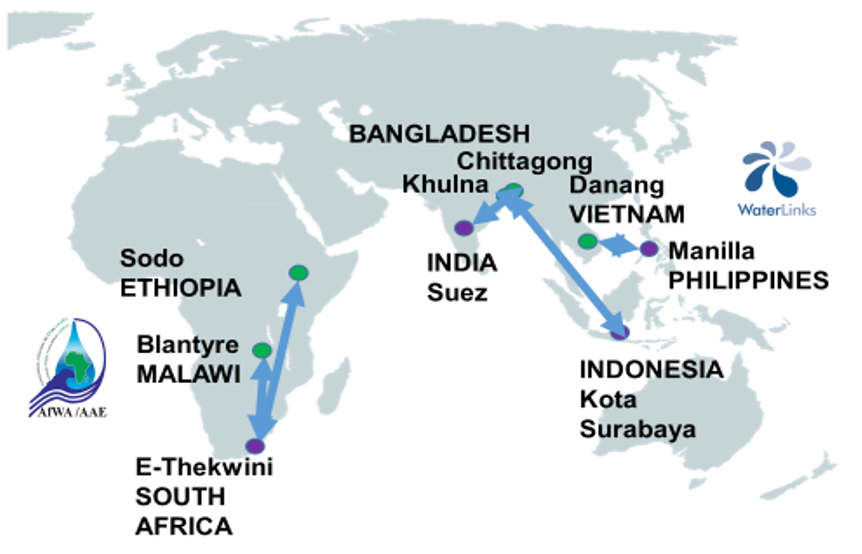
Asia
WaterLinks’ Executive Director, Ms. Mai Flor, expressed that, despite the challenges of the past two years, two of the three WOPs in the region were fully implemented after the 2019 field visits, and relevant progress was made in the selected working areas.
Ms. Flor commended the commitment of the individuals involved in the projects. “A lot has been achieved thanks to the teams and despite of the challenges, especially the language barrier, which was exacerbated by the need to work online, and from afar.”
WaterLinks’ Executive Director put emphasis on the fact that HR development, one of the working areas of the WOPs in the region, is more difficult to tackle in a context of remote work than other working areas, such as NRW management, since the latter can be addressed digitally with the use of existing templates.
This reflection kicked off an interesting conversation led from the mentor Manila Water. A representative from its HR department expressed that, in the same way NRW management can be translated into revenue for the water company, HR needs to interact in the same manner. Mayee Rivera-Miranda, Manila Water, expressed “how can management appreciate the rule and impact of HR on the utility’s relationship with stakeholders, revenue, and other strategic areas? With our mentee, DAWACO, we created KPIs to be able to analyze how HR contributes to the utility’s strategy. It might take time to finalize developing the metrics, but it is crucial since adding value to the company is at the core of HR.”
Danang Utility (Vietnam) – Manila Water (Philippines)
According to all partners involved in the WOP, this project has been very ambitious in its design, since it covered four working areas: NRW management, customer service, asset management and HR development, as mentioned above.
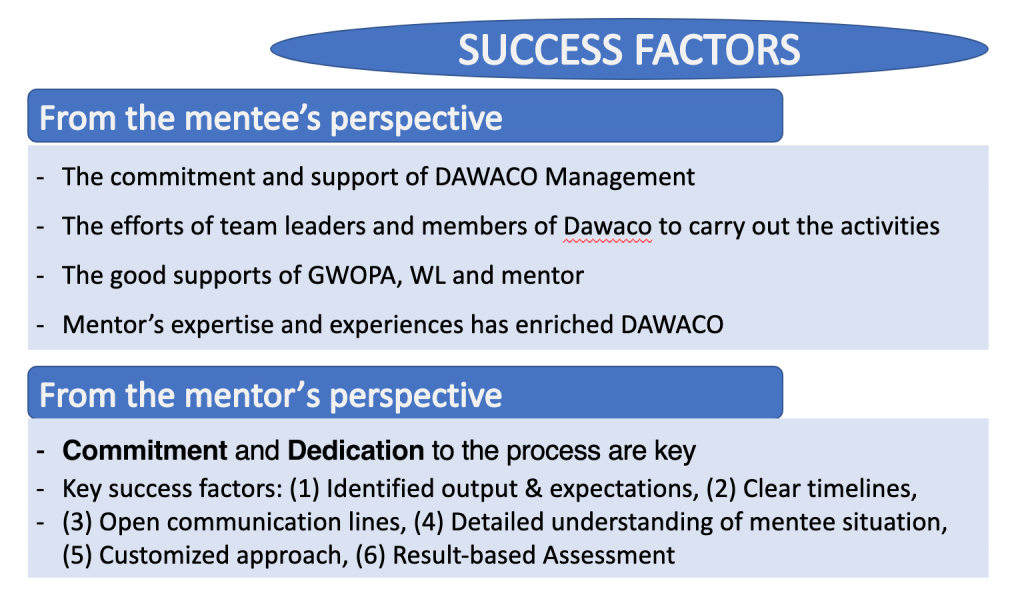
Slide from the WOP’s presentation during the workshop
The WOP accomplished a lot in its implementation. One of the main achievements was the use and adaptation by the mentee utility of a customer service questionnaire from the mentor utility. It was the first time for DAWACO, and the water company is considering doing this activity annually.
In terms of customer service, the mentee established a fully operational customer center, with newly hired personal. The operator invested from its own budget to achieve this crucial service.
For both Asian utilities, a pilot zone approach was led. In the 2 DMAs established through the project, a hydraulic modelling was experimented, and the team was able to lead a zero-pressure test, a first also for the mentor which guides the whole process online.
Khulna Water Supply and Sewerage Authority (Bangladesh) – Kota Surabaya (Indonesia)
The partners managed to meet only once before the travel restrictions. The visit from the mentee to the mentor’s premises was supposed to be done in early 2020, but COVID made it impossible for Khulna water company to visit their peers in Indonesia.
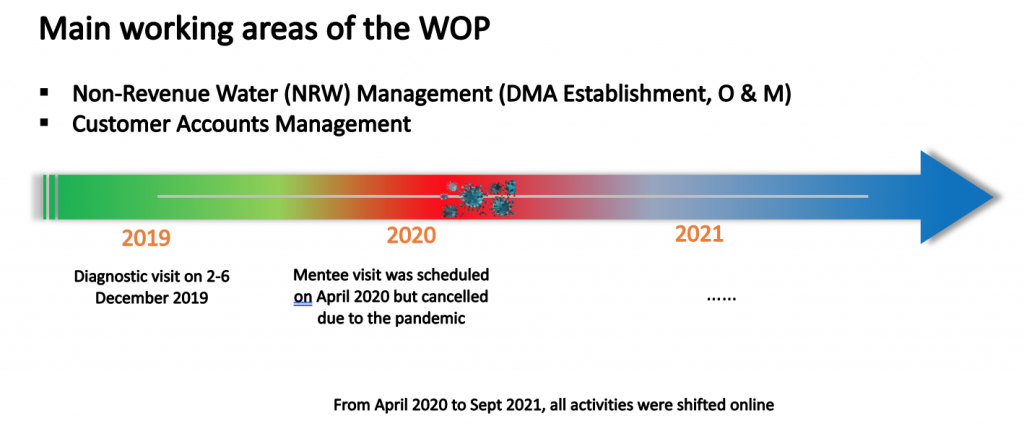
Slide from the WOP’s presentation during the workshop
From April 2020, the project switched to online work. According to Ms. Mai Flor, the online arrangement has worked particularly well in this WOP, and both teams from KWASA and PDAM Surabaya made several accomplishments in two working areas: NRW management and customer accounts management.
Khulna Water was able to establish 2 functional DMAs and lead a proper water balance calculation. Their plan is now to multiply the number of DMAs on the basis of their newly acquired competence. On Customer Account Management, the mentee successfully procured smart meter reading app under the mentor’s guidance on technical specifications:
- Successful use and application of smart meter reading app in pilot areas with 4,500 customers starting Sept 2021;
- Completed the clean-up and update of customer database in the pilot areas including the removal of 2,477 inactive accounts.
According to the mentor, the learning curve was mutual for mentor and mentee, as the online context was new for both. The dedication of Kota Surabaya is particularly remarkable given the fact that it was their first experience of an international WOP as mentor. One of the challenges expressed by the mentor is that, since the benchmarking visit did not take place, the mentees had to discover Kota Surabaya’s pipeline, map, etc., online. The language barrier was also a challenge.
Chittagong Water Supply (Bangladesh) and Sewerage Authority (Bangladesh) – Suez India
Even though diagnosis and exposure visits took place between November 2019 and March 2020, before the lockdown, and four initial working areas had been selected, the partnership had to be cancelled due to the difficulty to conduct field work given Chittagong’s severe COVID conditions and hard lockdowns. Also, the leadership within the mentee’s team failed to maintain the momentum without the mentor’s visits.
Africa
AfWA’s Director of Programs, Mr. Siméon Kenfack, started by honoring Mr. Charles Boti, who passed away prematurely in December 2021. Mr. Kenfack remembered the water expert, who had joined the African Association in 2018, and had been the coordinator of the SIP WOP program. “He was personally and professionally remarkable.”
Before the contributions from the mentors and mentees, Mr. Kenfack advanced that, after the 2019 field visits, all WOP activities had no other option but to adapt to the situation. According to AfWA’s Director of Programs, “we learnt to use online tools effectively, and we became experts. But in addition to that, which most WOP projects had to do, one important outcome from the context is that we realized even more the gap in sanitation work. We expanded our activities and reviewed the overall implementation in all working areas to include sanitation.”
Mr. Siméon Kenfack concluded by highlighting the opportunity the workshop was presenting to the Asian and African region to learn from each other and work collaboratively and thanked the donor and all SIP WOP partners for keeping the spirit of WOPs alive.
Sodo Town Water Utility (Ethiopia) – eThekwini Metropolitan Municipality Water Unit (South Africa)
One of the main activities of the WOP was the identification and mapping of poor households in Sodo. Initially, the aim was to connect 100 households, but within the two years of the implementation of the WOP, the project connected 1,125 households to Sodo’s utility water system. Due to the mapping of these households, the mentee now has relevant data and a total of 3,015 poor households have been identified.
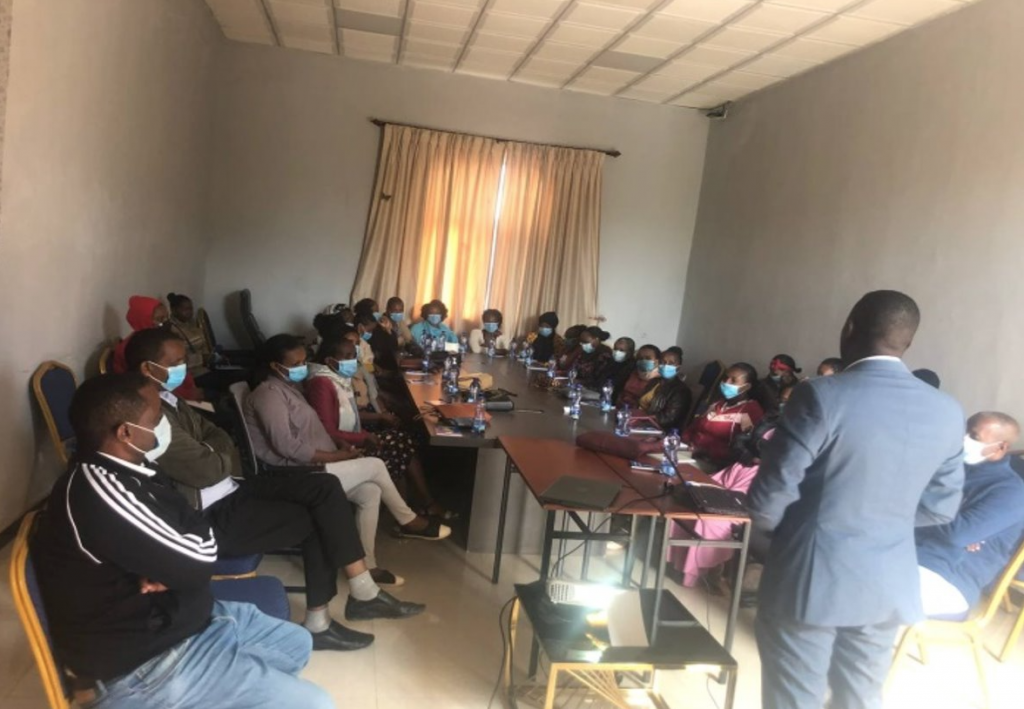
Awareness created amongst poor households. Courtesy of Sodo Town Water Utility
Here is where attention was also given to sanitation. The teams on the ground witnessed the difficulties these poor communities were facing on sanitation. It was decided to build six communal toilets.
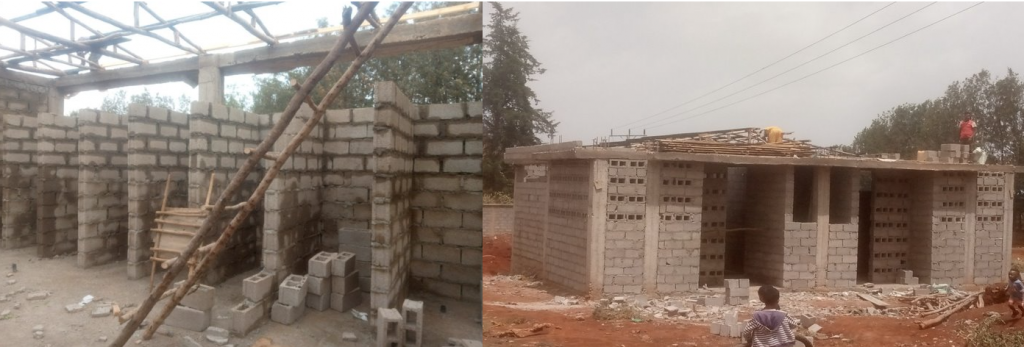
Construction of communal toilets in poor household areas. Courtesy of Sodo Town Water Utility
Another main working area was to reduce NRW. The 24-kilometre-long pipes were rusted, and all were replaced by new ones to improve the water quality and to reduce the loss of water.
Under the Operations & Maintenance working area, the actions focused on developing emergency plans and standard operation procedures, which Sodo Water Utility did not have before the WOP. Trainings were given to the utility’s staff.
According to the WOP’s mentee, the most successful outcomes for this project have been:
- The addition of the sanitation component, despite not being an anticipated component of the project;
- The knowledge acquired from eThekwini and AfWA, which is being applied;
- The international exposure made the utility staff to work on issues where they were lagging behind;
- The project made the utility to revise its plan every month based on the challenges;
- Water balance model started.
Sodo Town Water Utility was awarded best water operator of 2021 in Ethiopia and SNNP region mainly because of the objectives achieved through the WOP.
Blantyre Water Board (Malawi) – eThekwini Metropolitan Municipality Water Unit (South Africa)
The main challenge the WOP met was the halt of almost all activities due to the health situation. Inadequate materials due to financial constraints with some additional delay in procurement and illegal water connections were also two of the main challenges encountered.
The three working areas of this WOP are NRW, billing and revenue collection, and customer service. This WOP has yielded impressive achievements despite the challenges: water balancing is being done in 76 DMA’s thanks to the production meters installed in 3 locations, the replacement of 1,859 faulty meters, and the installation of 128 high accuracy meters.,BWB was able to conduct Water Audits in DMAs, to enhance the pressure management function, to map and digitize all the piped network and the meter connections. Moreover, for the first time, the operator developed a NRW Reduction Strategy and implemented on site billing.
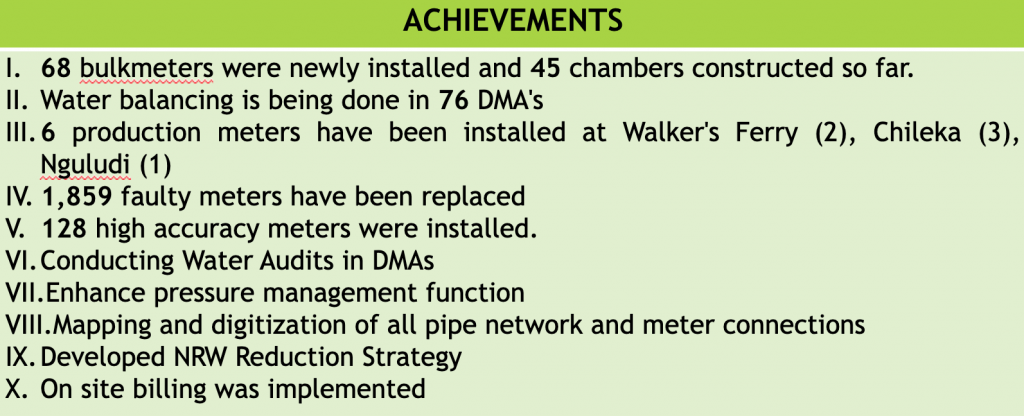
Slide from the WOP’s presentation during the workshop
According to the mentee, proactivity and commitment are key to success. Moreover, Blantyre expressed that, thank you to the mentor, eThekwini, more importance was given to the feedback from customers, and the motivation of the utility’s staff.
Conclusion
Ms. Anne Bousquet, Programme Management Officer at GWOPA, thanked all partners for the efforts made in these challenging times: “I am impressed by what has been achieved. This shows that the utility community can be very resilient and innovative. The spirit of WOPs is still alive thanks to the commitment and dedication from mentors, mentees, the regional coordinators and the donor. Even if the context changes, we are capable of adapting to it and finding innovative ways to continue the WOPs work.”
